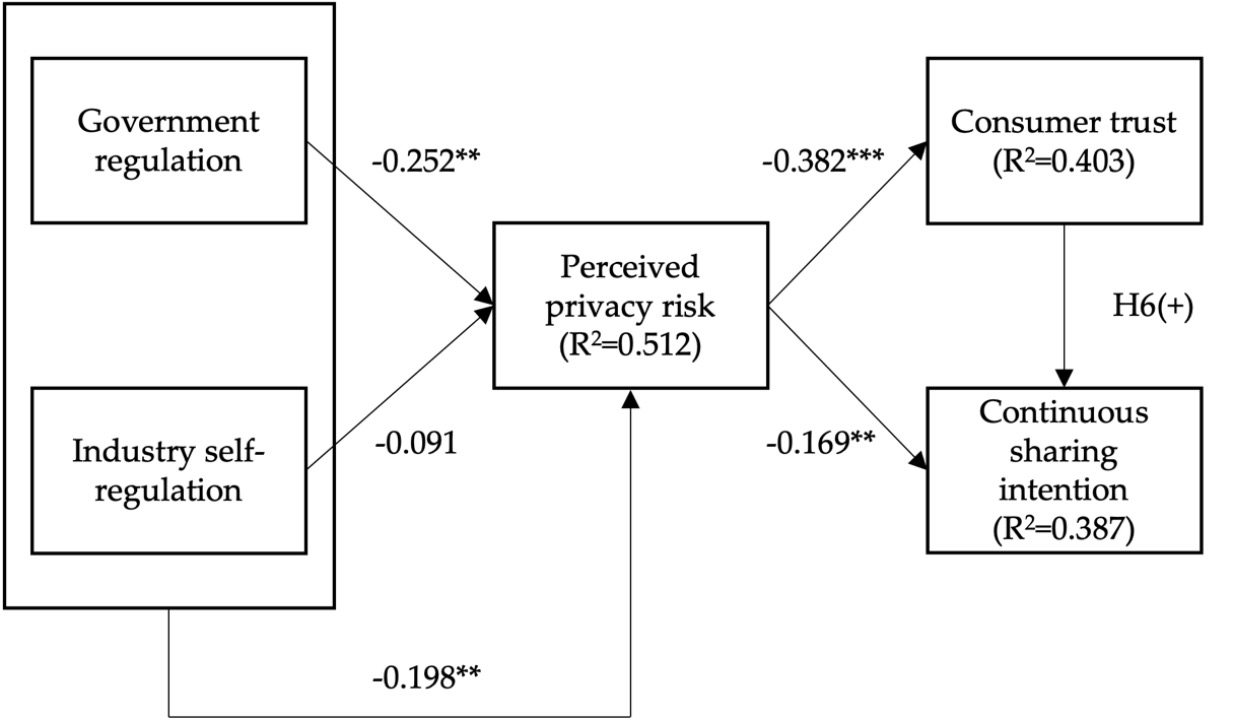The Impact of Regulatory Mechanisms in the Sharing Economy on Perceived Privacy Risk, Consumer Trust, and Continued Sharing Intention
DOI:
https://doi.org/10.71113/JMSS.v2i4.368Keywords:
sharing economy, government regulation, industry self-regulation, perceived privacy risk, consumer trust, continuous sharing intentionAbstract
The sharing economy represents a peer-to-peer exchange business model that enables the sharing or rental of goods and services through internet platforms. Despite its enormous development potential, the sharing economy has gradually exposed regulatory challenges, inadequate platform mechanisms, and weak community foundations. This study employs structural equation modeling to empirically examine the effects of sharing economy regulatory mechanisms on perceived privacy risk, consumer trust, and continuous sharing intention. Based on 406 valid questionnaires from users of mainstream Chinese sharing economy platforms, our findings reveal that government regulation significantly reduces perceived privacy risk, while industry self-regulation alone shows no significant negative impact. However, the interaction between government and industry self-regulation demonstrates significant negative effects on perceived privacy risk. Furthermore, perceived privacy risk negatively influences both consumer trust and continuous sharing intention, while consumer trust positively affects continuous sharing intention.
References
Barnes, S. J., & Mattsson, J. (2017). Understanding collaborative consumption: Test of a theoretical model. Technological Forecasting & Social Change, 118, 281-292. DOI: 10.1016/j.techfore.2017.02.029.
Black, J. (2001). Decentring regulation: Understanding the role of regulation and self-regulation in a "post-regulatory" world. Current Legal Problems, 54(1), 103-146. DOI: 10.1093/clp/54.1.103.
Bucher, E., Fieseler, C., & Lutz, C. (2016). What's mine is yours (for a nominal fee)—exploring the spectrum of utilitarian to altruistic motives for internet-mediated sharing. Computers in Human Behavior, 62, 316-326. DOI: 10.1016/j.chb.2016.04.002.
Cannon, S., & Summers, L. H. (2014). How Uber and the sharing economy can win over regulators. Harvard Business Review, 13(10), 24-28.
Cheng, X., Fu, S., & de Vreede, G. J. (2021). Trust in the ride hailing service of the sharing economy: The roles of legitimacy and process transparency. Journal of Organizational and End User Computing, 33(6), 1-21. DOI: 10.4018/JOEUC.20211101.oa10.
Chong, A. Y. L. (2013). Understanding mobile commerce continuance intentions: An empirical analysis of Chinese consumers. Data Processor for Better Business Education, 53(4), 22-30. DOI: 10.1080/08874417.2013.11645647.
Cohen, M., & Sundararajan, A. (2017). Self-regulation and innovation in the peer-to-peer sharing economy. University of Chicago Law Review Online, 82(1), 116-133.
Cohen, M., & Zehngebot, C. (2014). What's old becomes new: Regulating the sharing economy. Boston Bar Journal. Retrieved from http://bostonbarjournal.com/2014/04/01/whats-old-becomes-new-regulating-the-sharing-economy
Das Acevedo, D. (2016). Regulating employment relationships in the sharing economy. Employee Rights and Employment Policy Journal, 20(1), 1-35.
Edelman, B., Luca, M., & Svirsky, D. (2017). Racial discrimination in the sharing economy: Evidence from a field experiment. American Economic Journal-Applied Economics, 9(2), 1-22. DOI: 10.1257/app.20160213.
Ert, E., Fleischer, A., & Magen, N. (2016). Trust and reputation in the sharing economy: The role of personal photos in Airbnb. Tourism Management, 55, 62-73. DOI: 10.1016/j.tourman.2016.01.013.
Fang, B., Ye, Q., & Law, R. (2016). Effect of sharing economy on tourism industry employment. Annals of Tourism Research, 57, 264-267. DOI: 10.1016/j.annals.2015.11.018.
Grabner-Kräuter, S., & Faullant, R. (2008). Consumer acceptance of internet banking: The influence of internet trust. International Journal of Bank Marketing, 26(7), 483-504. DOI: 10.1108/02652320810913855.
Gupta, B., Iyer, L. S., & Weisskirch, R. S. (2010). Facilitating global e-commerce: A comparison of consumers' willingness to disclose personal information online in the U.S. and in India. Journal of Electronic Commerce Research, 11(1), 231-243.
Hamari, J., Sjöklint, M., & Ukkonen, A. (2016). The sharing economy: Why people participate in collaborative consumption. Journal of the Association for Information Science and Technology, 67(9), 2047-2059. DOI: 10.1002/asi.23552.
Hartl, B., Hofmann, E., & Kirchler, E. (2015). Do we need rules for "what's mine is yours"? Governance in collaborative consumption communities. Journal of Business Research, 69(8), 2756-2763. DOI: 10.1016/j.jbusres.2015.11.011.
Hong, S., & Lee, S. (2018). Adaptive governance and decentralization: Evidence from regulation of the sharing economy in multi-level governance. Government Information Quarterly, 35(2), 299-305. DOI: 10.1016/j.giq.2017.08.002.
Hui, K. L., Teo, H. H., & Lee, S. Y. T. (2007). The value of privacy assurance: An exploratory field experiment. MIS Quarterly, 31(1), 19-33. DOI: 10.2307/25148779.
Johnson, K. K., & Mun, J. M. (2016). Antecedents to internet use to collaboratively consume apparel. Journal of Fashion Marketing and Management: An International Journal, 20(4), 370-382. DOI: 10.1108/JFMM-12-2015-0092.
Keetels, L. (2013). Collaborative consumption: The influence of trust on sustainable peer-to-peer product-service systems [Doctoral dissertation]. Utrecht University.
Kim, D. J., Ferrin, D. L., & Rao, H. R. (2008). A trust-based consumer decision-making model in electronic commerce: The role of trust, perceived risk, and their antecedents. Decision Support Systems, 44(2), 544-564. DOI: 10.1016/j.dss.2007.07.001.
Liang, L. J., Choi, H. C., & Joppe, M. (2018). Exploring the relationship between satisfaction, trust and switching intention, repurchase intention in the context of Airbnb. International Journal of Hospitality Management, 69, 41-48. DOI: 10.1016/j.ijhm.2017.10.015.
Lindblom, A., & Lindblom, T. (2017). De-ownership orientation and collaborative consumption during turbulent economic times. International Journal of Consumer Studies, 41, 431-438. DOI: 10.1111/ijcs.12336.
Listokin, S. (2017). Does industry self-regulation of consumer data privacy work? IEEE Security & Privacy, 15(2), 92-95. DOI: 10.1109/MSP.2017.38.
Liu, C., Marchewka, J. T., Lu, J., & Yu, C. S. (2004). Beyond concern—a privacy-trust-behavioral intention model of electronic commerce. Information and Management, 42(2), 289-304. DOI: 10.1016/j.im.2004.01.003.
Lwin, M., Wirtz, J., & Williams, J. D. (2007). Consumer online privacy concerns and responses: A power-responsibility equilibrium perspective. Journal of the Academy of Marketing Science, 35(4), 572-585. DOI: 10.1007/s11747-006-0003-3.
Martin, C. J. (2016). The sharing economy: A pathway to sustainability or a nightmarish form of neoliberal capitalism? Ecological Economics, 121, 149-159. DOI: 10.1016/j.ecolecon.2015.11.027.
Martin, K. (2018). The penalty for privacy violations: How privacy violations impact trust online. Journal of Business Research, 82, 103-116. DOI: 10.1016/j.jbusres.2017.08.034.
Martin, K. D., Borah, A., & Palmatier, R. W. (2017). Data privacy: Effects on customer and firm performance. Journal of Marketing, 81(1), 36-58. DOI: 10.1509/jm.15.0497.
Miltgen, C. L., & Smith, H. J. (2015). Exploring information privacy regulation, risks, trust, and behavior. Information & Management, 52(6), 741-759. DOI: 10.1016/j.im.2015.06.006.
Möhlmann, M. (2015). Collaborative consumption: Determinants of satisfaction and the likelihood of using a sharing economy option again. Journal of Consumer Behaviour, 14(3), 193-207. DOI: 10.1002/cb.1512.
Möhlmann, M. (2017). Digital trust and peer-to-peer collaborative consumption platforms: A mediation analysis. DOI: 10.2139/ssrn.2813367.
Munkøe, M. M. (2017). Regulating the European sharing economy: State of play and challenges. Intereconomics, 52(1), 38-44. DOI: 10.1007/s10272-017-0641-3.
Murphy, M. (2016). Cities as the original sharing platform: Regulation of the new "sharing" economy. Journal of Business & Technology Law, 12(1), 127-149.
National Information Center. (2018). China Sharing Economy Development Report (2018). Retrieved from http://www.sic.gov.cn/News/568/8873.htm
Pavlou, P. A., & Gefen, D. (2004). Building effective online marketplaces with institution-based trust. Information Systems Research, 15(1), 37-59. DOI: 10.1287/isre.1040.0015.
Posen, H. A. (2015). Ridesharing in the sharing economy: Should regulators impose Uber regulations on Uber? Iowa Law Review, 101(1), 405-433.
Schor, J. B. (2017). Does the sharing economy increase inequality within the eighty percent?: Findings from a qualitative study of platform providers. Cambridge Journal of Regions, Economy and Society, 10(2), 263-279. DOI: 10.1093/cjres/rsw047.
Smith, H. J., Milberg, S. J., & Burke, S. J. (1996). Information privacy: Measuring individuals' concerns about organizational practices. MIS Quarterly, 20(2), 167-196. DOI: 10.2307/249477.
Tang, Q. L. (2015). Regulatory path of "ride-sharing" sharing economy. China Legal Science, (4), 286-302.
Teubner, T., Hawlitschek, F., & Dann, D. (2017). Price determinants on Airbnb: How reputation pays off in the sharing economy. Journal of Self-Governance and Management Economics, 5(4), 53-80. DOI: 10.22381/JSME5420174.
Xie, X. M., & Shi, J. J. (2016). Empirical research on consumer trust formation mechanism in sharing economy. Technology Economics, 35(10), 122-127. DOI: 10.3969/j.issn.1002-980X.2016.10.017.
Xu, H., Teo, H. H., Tan, B. C. Y., & Agarwal, R. (2012). Effects of individual self-protection, industry self-regulation, and government regulation on privacy concerns: A study of location-based services. Information Systems Research, 23(4), 1342-1363. DOI: 10.1287/isre.1120.0416.
Zhou, T. (2012). Examining location-based services usage from the perspectives of unified theory of acceptance and use of technology and privacy risk. Journal of Electronic Commerce Research, 13(2), 135-144.

Downloads
Published
How to Cite
Issue
Section
License
Copyright (c) 2025 Huaqi Wen

This work is licensed under a Creative Commons Attribution 4.0 International License.


























